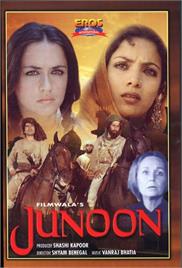Be Careful of Fake Websites. Always use HindiMovies.to domain & Join our Telegram Channel for Latest Updates.

Likes: 6
Views: 4.04K
The movie chronicles the period of 1857 to 1858 when the soldiers of the East India Company mutinied and many smaller kingdoms joined the soldiers in the hope of regaining their territories from the English. The movie is shown from the perspective of one of the leaders of the fight (Shashi Kapoor).
Duration: 141 min
Released: 1979
IMDb Rating: 7.4/10 (304 Votes)
Genre: Drama, Hindi Movies
Stars: Jalal Agha, Tom Alter, Nafisa Ali, Shabana Azmi
Directors: Shyam Benegal
Writers: Ismat Chughtai, Satyadev Dubey, Shyam Benegal, Ruskin Bond
Year: 1978
Server 1 – Openload
Server 2 – Vidto
Server 3 – Streamin
Junoon (1979): A Cinematic Journey into Passion and Patriotism
Introduction
Junoon, the 1979 Hindi drama film, remains an iconic piece in the annals of Indian cinema. Directed by Shyam Benegal, a stalwart known for his realistic and thought-provoking cinema, Junoon weaves a compelling narrative set against the backdrop of the Indian Rebellion of 1857. The film's rich storytelling, nuanced performances, and evocative music make it a timeless classic.
Plot Overview
The story unfolds during the turbulent times of the Indian Mutiny of 1857, a pivotal moment in India's struggle against British colonial rule. Junoon, translating to 'Passion' or 'Obsession,' delves deep into the psyche of a nation and its people engulfed in turmoil.
The plot centers around Javed, played by the illustrious Shashi Kapoor, a passionate and patriotic man caught between his personal desires and his commitment to the rebellion. As the uprising brews, Javed's life becomes entangled with Imtiyaz, portrayed by Nafisa Ali, a symbol of resilience and hope. Their intertwined fates navigate love, sacrifice, and the haunting cost of freedom.
The narrative captures the complexity of human emotions amid political upheaval. It portrays the internal conflicts faced by individuals torn between duty and love, highlighting the nuances of loyalty and passion. The film doesn’t merely depict historical events but humanizes the epoch, making the viewers connect deeply with the characters’ struggles.
Director and Writing
Shyam Benegal, the visionary director of Junoon, has long been celebrated for his ability to blend social realism with cinematic artistry. His direction in Junoon stands out as a masterclass in storytelling, balancing epic historical canvas with intimate human experiences. Benegal's attention to detail in recreating the 19th-century milieu and his sensitive handling of complex character arcs are notable highlights.
The film’s screenplay and writing are also credited to Shama Zaidi, an accomplished writer known for her profound narratives and meticulous research. Together with Benegal, the duo crafts a screenplay that is both evocative and insightful, providing depth to every character and scene. Their collaboration ensures that the film remains authentic, emotionally compelling, and intellectually stimulating.
Main Cast
The chemistry between the leads elevates the film, grounding the grand historical events in intimate human drama.
Music and Songs
Junoon’s soundtrack, composed by the legendary Zakir Hussain and Vanraj Bhatia, enhances the film’s evocative ambiance. The music intricately blends classical Indian melodies with the period setting, enriching the emotional quotient of the narrative.
These songs not only serve as musical interludes but also deepen the narrative by echoing the characters’ inner emotions. The soulful singer line-up, featuring Hariharan, Vani Jairam, and Yesudas, brings authenticity and richness to the soundtrack.
Technical Aspects
Junoon’s cinematography by Govind Nihalani is remarkable, vividly capturing the lush landscapes and historical settings that transport the audience back to mid-19th century India. The visual narrative complements the film's layered storytelling.
The dialogues are penned with precision, blending Urdu and Hindi to maintain period authenticity while making it accessible to contemporary audiences. The production design meticulously reconstructs the era's ambiance, from costumes to architecture, enhancing the film's immersive experience.
Cultural and Historical Significance
Junoon is more than a historical drama; it is a meditation on obsession—whether with freedom, love, or loss. The film carefully examines the individual’s role in the broader canvas of history, making it an enduring study on human passion against political chaos.
Furthermore, the film is notable for its portrayal of communal harmony amidst conflict, emphasizing unity in diversity—a theme still relevant in modern India. Junoon’s sensitive depiction of history is devoid of jingoism, focusing instead on the shared humanity of all characters.
Reception and Legacy
Upon its release, Junoon garnered critical acclaim for its thoughtful narrative and stellar performances. It won accolades at various national and international forums, highlighting India's cinematic prowess on the global stage. The film continues to be studied for its artistic merit and historical context.
Shashi Kapoor’s portrayal of Javed is often cited as one of his finest performances, and Nafisa Ali's role helped cement her position as a formidable actress in Hindi cinema. Junoon's influence can be seen in later historical dramas that seek to blend personal narrative with grand historical events.
Conclusion
Junoon (1979) stands as a testament to the power of cinema to transport, educate, and evoke deep emotions. Through its richly layered story, compelling characters, and evocative music, it invites viewers to reflect on the fervor of passion and the complex pursuit of freedom.
For lovers of historical dramas and meaningful cinema, Junoon is not just a movie but an experience—a vivid portrayal of a defining moment in India's history captured with artistic brilliance and heartfelt emotion.